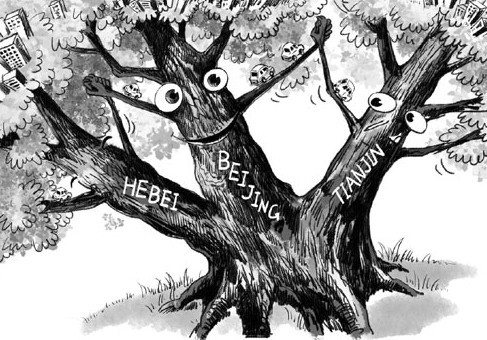

Decongesting cities is a major problem facing governments and analysts across the world. The problem is more for cities that are old and with urban infrastructure and planning lacking the physical space to rapidly expand and modernize.
For many cities, geographical boundaries become major limitations for their expansion. Even if city development is essentially vertical with emphasis on tall constructions, the supporting infrastructure, particularly for public transport, needs space to expand.
This need is being felt by Beijing for quite some time now. The plan to integrate Beijing, Tianjin and Baoding - in Hebei province bordering Beijing - into a joint development region is expected to result in significant decongestion by easing both the residential and industrial pressures on Beijing.
The Beijing-Tianjin-Baoding model of development is expected to have Beijing as the core and Tianjin and Baoding as the two arms of the core stretching into the periphery.
Tianjin is one of the four centrally administered cities in China - the others being Beijing, Shanghai and Chongqing - and has already achieved considerable economic modernization and development. Its growth has been significantly contributed by its geographical proximity to Beijing.
Baoding is already well connected to Beijing. And once the formal model of integration of the three cities is established, Baoding's economic prospects will improve further. The integrated region is expected to be centrally administered and might give Baoding an administrative status similar to that of Beijing and Tianjin.
Urban decongestion is the primary objective of the integration plan, whose main beneficiary should be Beijing. As the capital, as well as one of the main centers of economic activity in the country, Beijing has experienced rapid urbanization during the last 10 to 15 years. Migration of a large number of people from rural areas in search of livelihood has led to a rising demand for hukou (household registration) in Beijing. The new applications for household registration have implications for the social security system of the city. They also have implications for urbanization in terms of the need to expand civic facilities, particularly transport, sanitation and water distribution networks.
Growth in urban population has also had played a role in rapidly rising pollution levels in the city through increased use of vehicles and energy intensive household appliances.
The proposed integration of the three cities would ideally result in relocation of several industries from Beijing. These are typically expected to be the relatively non-core and labor-intensive industries. As the country's political and administrative capital, Beijing will look forward to retaining the core, technology intensive and cutting-edge next-generation industries. They would prosper by being in the capital and benefit from the strategic and global interface that Beijing offers.
But if the non-core industries shift to Baoding, there might be concern among local people that they will get to inherit Beijing's burden of intense urbanization. This might have some adverse effects on Baoding's long-term urban and industrial sustainability.
One of the issues that have acquired significance in the context of the larger plan of integration of the three cities is the role of Baoding as a "political sub-capital". Though later the "political sub-capital" was denied as a rumor, it's confirmed that there are plans to move part of administrative function of Beijing to Baoding. It is not clear how the planners expect to "shift" this function.
Beijing has enjoyed unparalleled historical importance as the national capital. What the planners might be aiming for is to develop Baoding as a city that can take over some of the functions that Beijing serves as a political capital. And one of those could be relocation of some central government offices and agencies to Baoding.
Such relocation would immediately enhance Baoding's prestige in the country and help its growth as a political and administrative hub in the shadow of Beijing. The relocation, however, is not going to be easy. Government offices used to functioning in Beijing might be reluctant to shift to Baoding given the advantages of working in Beijing, particularly their proximity to other ministries, departments and agencies. Again, like industrial relocation, the decision might be to relocate those offices and agencies that are relatively less important. Such decision has the possibility of creating friction between departments that are chosen to relocate and those that are not.
The integration will require careful planning and gradual implementation.
But even before the first move is made, property prices have increased in Baoding in anticipation of the higher political and administrative status it is expected to get. The critical issue for planners will be to ensure that growth in urban infrastructure in the integrated zone takes place in a manner that helps decongest urban areas and at the same time makes living in the zone an affordable option, particularly for those who migrate from outside.
The author is head (partnership & programme) and senior research fellow at the Institute of South Asian Studies in the National University of Singapore.
Copyright ©1999-2018
Chinanews.com. All rights reserved.
Reproduction in whole or in part without permission is prohibited.